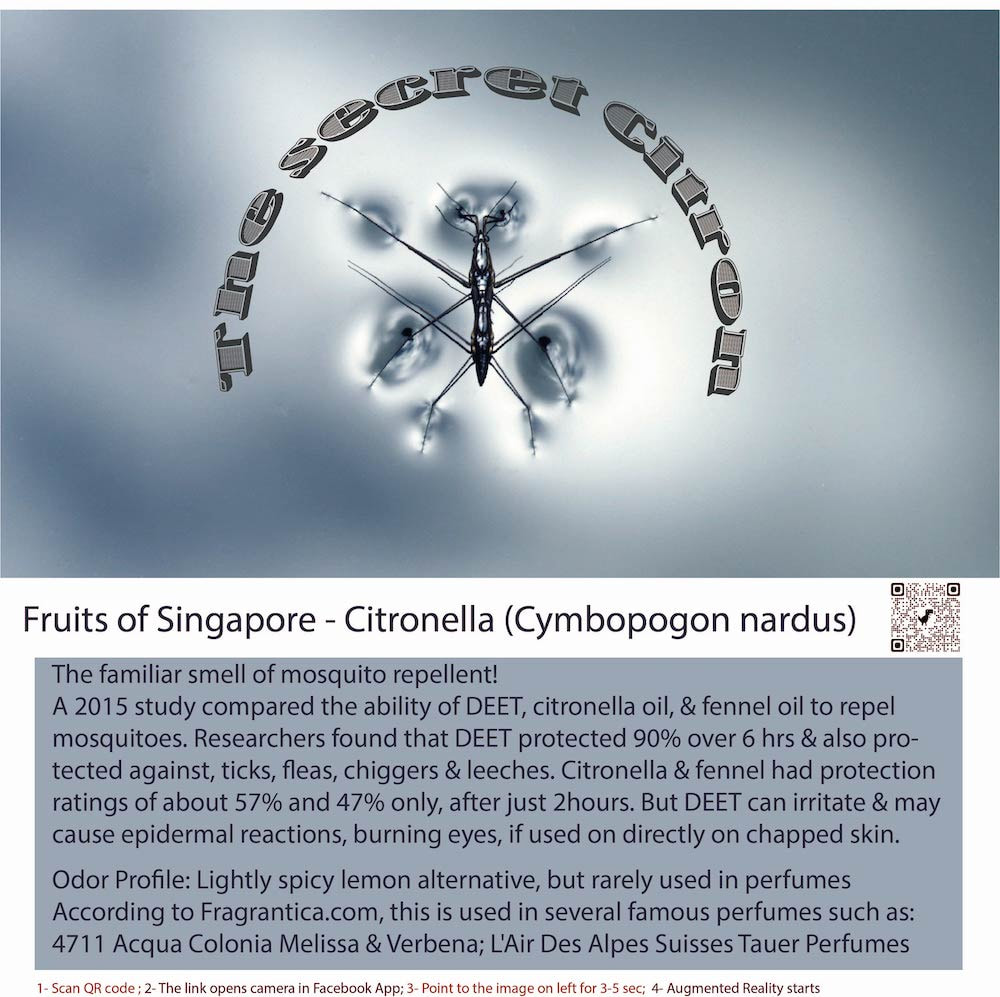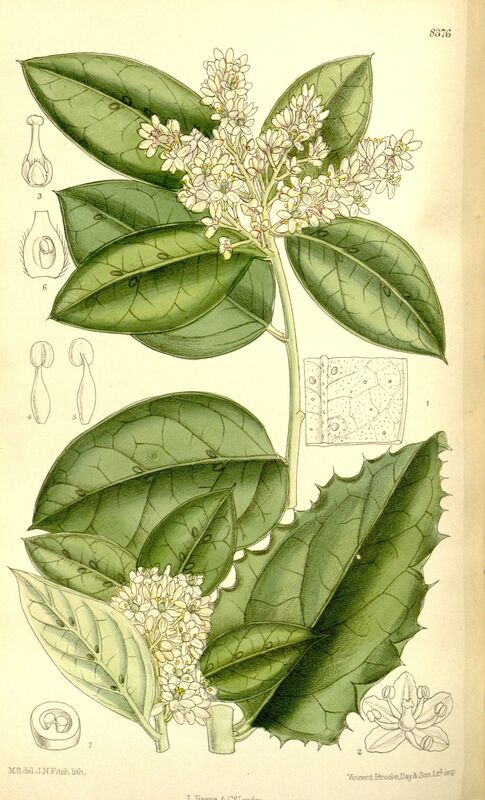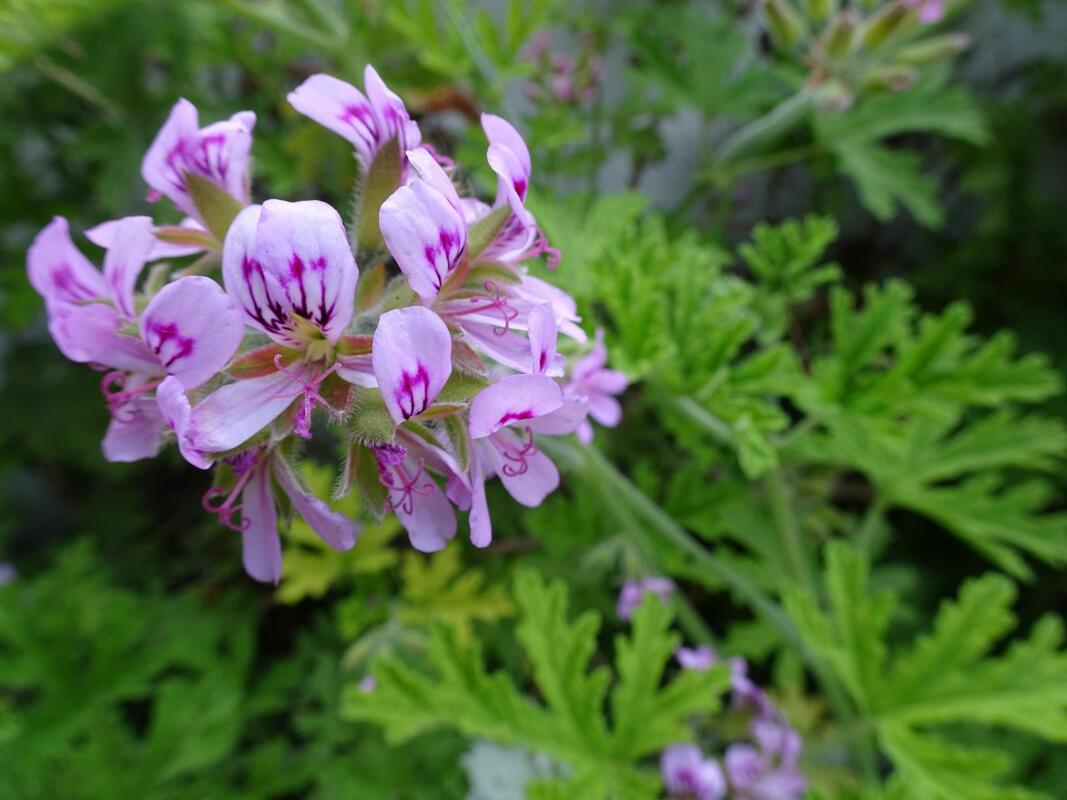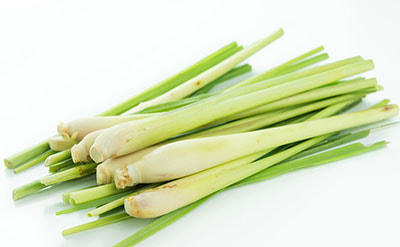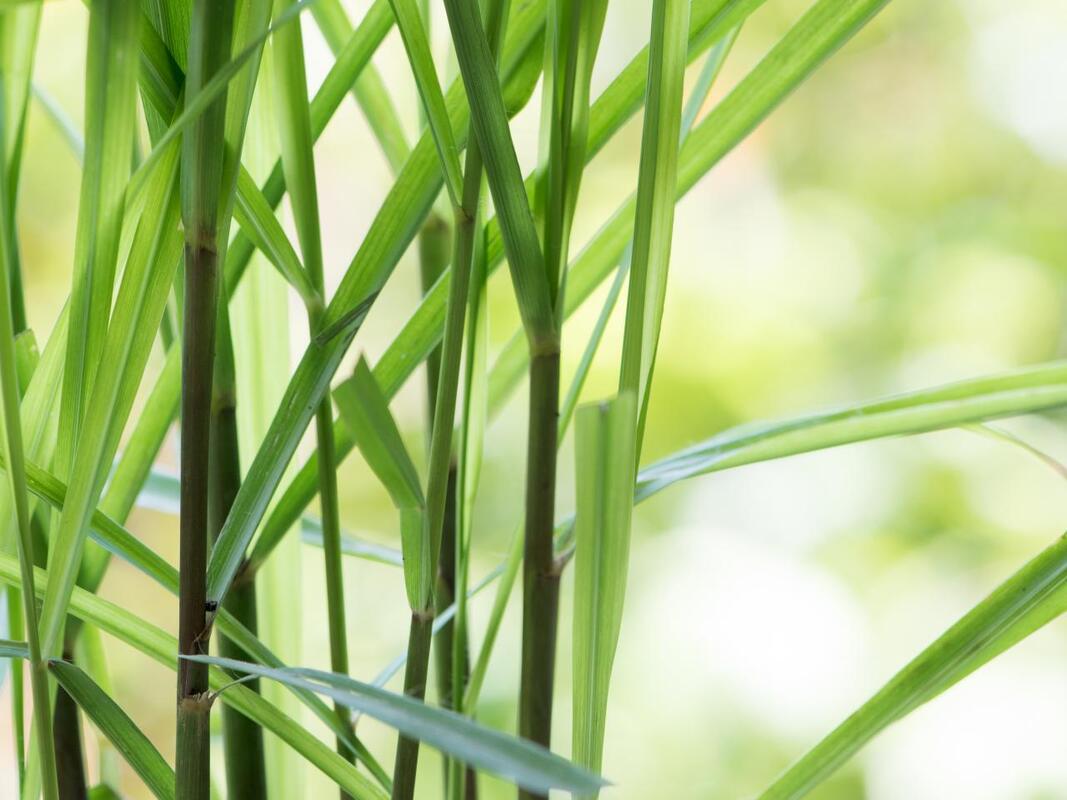Benefits of Citronella in Perfume
Citronella: The Aromatic Wonder with Multi-Faceted Uses
Citronella, with its distinctive lemon-like aroma, has captured the attention of various industries due to its versatile applications in perfumes, fragrances, therapeutic oils, food, medicinal systems, history, and even fun crazy facts. Let's explore the fascinating world of citronella and its wide-ranging uses across different domains.
Aromatic Allure in Perfumes and Fragrances: Citronella's fresh and uplifting scent makes it a popular choice in perfumes and fragrances. Its lemony notes add a bright and invigorating element to many aromatic compositions. In the perfume industry, citronella is often used to create citrusy, clean, and summery scents that evoke a sense of vitality and energy.
Therapeutic Properties in Essential Oils: Citronella essential oil, derived from the leaves and stems of the citronella plant, is renowned for its therapeutic properties. It is often used in aromatherapy for its calming and relaxing effects, helping to alleviate stress and anxiety. Citronella oil is also known for its insect-repelling abilities, making it a popular ingredient in natural mosquito repellents.
Culinary Uses and Food Flavoring: While citronella is not commonly used as a culinary herb, its leaves are sometimes added to certain dishes in Southeast Asian cuisines for their subtle lemon flavor. Additionally, citronella is used to make herbal teas and infusions, adding a refreshing and aromatic touch to the beverages.
Medicinal Applications: Citronella has been used in traditional medicine systems for various purposes. In some cultures, it is believed to have anti-inflammatory properties and is used to soothe minor skin irritations and insect bites. Additionally, citronella is sometimes used in herbal remedies to alleviate digestive issues and promote overall well-being.
Historical Significance and Cultural Significance: Citronella has been used for centuries by various cultures for its aromatic and medicinal properties. Its origins can be traced back to Southeast Asia, where it was traditionally used in natural insect repellents. Over time, citronella became popular in different parts of the world for its versatile applications.
Fun and Crazy Facts:
Citronella, with its lemony aroma and multifaceted uses, is an aromatic wonder that has earned its place in various industries. From perfumes and fragrances to therapeutic oils, food, and medicinal applications, citronella's versatility is truly remarkable. Whether in repelling insects, promoting relaxation, or adding a unique flavor to culinary creations, citronella continues to captivate and benefit humanity in numerous ways. As we appreciate its rich history, cultural significance, and fun facts, citronella remains an enduring and cherished botanical treasure.
Citronella, with its distinctive lemon-like aroma, has captured the attention of various industries due to its versatile applications in perfumes, fragrances, therapeutic oils, food, medicinal systems, history, and even fun crazy facts. Let's explore the fascinating world of citronella and its wide-ranging uses across different domains.
Aromatic Allure in Perfumes and Fragrances: Citronella's fresh and uplifting scent makes it a popular choice in perfumes and fragrances. Its lemony notes add a bright and invigorating element to many aromatic compositions. In the perfume industry, citronella is often used to create citrusy, clean, and summery scents that evoke a sense of vitality and energy.
Therapeutic Properties in Essential Oils: Citronella essential oil, derived from the leaves and stems of the citronella plant, is renowned for its therapeutic properties. It is often used in aromatherapy for its calming and relaxing effects, helping to alleviate stress and anxiety. Citronella oil is also known for its insect-repelling abilities, making it a popular ingredient in natural mosquito repellents.
Culinary Uses and Food Flavoring: While citronella is not commonly used as a culinary herb, its leaves are sometimes added to certain dishes in Southeast Asian cuisines for their subtle lemon flavor. Additionally, citronella is used to make herbal teas and infusions, adding a refreshing and aromatic touch to the beverages.
Medicinal Applications: Citronella has been used in traditional medicine systems for various purposes. In some cultures, it is believed to have anti-inflammatory properties and is used to soothe minor skin irritations and insect bites. Additionally, citronella is sometimes used in herbal remedies to alleviate digestive issues and promote overall well-being.
Historical Significance and Cultural Significance: Citronella has been used for centuries by various cultures for its aromatic and medicinal properties. Its origins can be traced back to Southeast Asia, where it was traditionally used in natural insect repellents. Over time, citronella became popular in different parts of the world for its versatile applications.
Fun and Crazy Facts:
- Citronella candles and torches are popular outdoor accessories, known for their ability to deter mosquitoes and other insects due to the oil's insect-repelling properties.
- In some cultures, citronella is used in spiritual practices to purify spaces and ward off negative energies.
- The citronella plant (Cymbopogon nardus) is a member of the grass family, and its slender green leaves are the primary source of citronella essential oil.
Citronella, with its lemony aroma and multifaceted uses, is an aromatic wonder that has earned its place in various industries. From perfumes and fragrances to therapeutic oils, food, and medicinal applications, citronella's versatility is truly remarkable. Whether in repelling insects, promoting relaxation, or adding a unique flavor to culinary creations, citronella continues to captivate and benefit humanity in numerous ways. As we appreciate its rich history, cultural significance, and fun facts, citronella remains an enduring and cherished botanical treasure.
To experience augmented reality, please open the Facebook-app using QR code and point to the image below
Discover Our Citrus Perfume Collection
Citronella is a genus of plants in the family Poaceae. The most common species used for citronella oil is Cymbopogon nardus. The oil is used as an insect repellent, as well as in perfumes and candles. It is often used in outdoor settings to keep mosquitoes away. The plant is native to tropical Asia and is widely cultivated in Africa, Central and South America, the Caribbean, and the Pacific islands.
Citronella oil is an essential oil obtained from the leaves and stems of different species of Cymbopogon (lemongrass). It's oil is a plant-based insect repellent and has been registered for this use in the United States since 1948. Citronella oil has strong antifungal properties.
Citronella is commonly grown in Singapore as a ornamental plant and for its oil production. Citronella oil is used as a natural insect repellent, and is popular in Singapore due to the high mosquito population and the tropical climate. Citronella plants are often grown in gardens and on balconies to help keep mosquitoes away. The oil can also be found in various products such as candles, lotions, and sprays. In addition to being used as a mosquito repellent, citronella oil is also used in perfumes, soaps, and other personal care products.
Sir Stamford Raffles, the founder of modern Singapore, is known to have introduced Citronella to Singapore. He brought several species of plants and animals with him when he arrived in Singapore in 1819. Citronella was among the plants he brought along, as it was known for its mosquito-repelling properties. Raffles recognized the potential of citronella as a cash crop, and encouraged the cultivation of the plant in Singapore. Citronella oil became an important export for Singapore, and the plant continues to be grown in the country to this day. Raffles' introduction of citronella to Singapore played a significant role in the development of the country's economy and the improvement of the living conditions for its inhabitants.
Citronella oil is an essential oil obtained from the leaves and stems of different species of Cymbopogon (lemongrass). It's oil is a plant-based insect repellent and has been registered for this use in the United States since 1948. Citronella oil has strong antifungal properties.
Citronella is commonly grown in Singapore as a ornamental plant and for its oil production. Citronella oil is used as a natural insect repellent, and is popular in Singapore due to the high mosquito population and the tropical climate. Citronella plants are often grown in gardens and on balconies to help keep mosquitoes away. The oil can also be found in various products such as candles, lotions, and sprays. In addition to being used as a mosquito repellent, citronella oil is also used in perfumes, soaps, and other personal care products.
Sir Stamford Raffles, the founder of modern Singapore, is known to have introduced Citronella to Singapore. He brought several species of plants and animals with him when he arrived in Singapore in 1819. Citronella was among the plants he brought along, as it was known for its mosquito-repelling properties. Raffles recognized the potential of citronella as a cash crop, and encouraged the cultivation of the plant in Singapore. Citronella oil became an important export for Singapore, and the plant continues to be grown in the country to this day. Raffles' introduction of citronella to Singapore played a significant role in the development of the country's economy and the improvement of the living conditions for its inhabitants.
Energizing Aromas for Every Occasion
The citronella oil is used extensively as a source of perfumery chemicals such as citronellal, citronellol, and geraniol. These chemicals find extensive use in soap, candles and incense, perfumery, cosmetic, and flavouring industries throughout the world.
In traditional medicine systems such as Ayurveda, citronella oil is believed to have therapeutic properties. It is commonly used to treat a variety of conditions, including fever, cold, flu, headaches, and muscle pain. It is also used as an anti-inflammatory, and to alleviate stress and anxiety.
In Ayurveda, citronella oil is believed to help balance the kapha and vata doshas. The oil is said to have a cooling effect on the body, and is used to pacify excessive heat or inflammation. It is also believed to help improve circulation, and to support the proper functioning of the respiratory and digestive systems.
Citronella oil is usually used in Ayurveda in the form of massage oil, inhalation, or being added to the bath water. It is also used in Ayurvedic formulations as an ingredient.
It is important to note that, as with any traditional or alternative medicine, it is always best to consult with a qualified practitioner before using citronella oil or any other natural remedy, as it may interact with other medications or have side effects.
In traditional medicine systems such as Ayurveda, citronella oil is believed to have therapeutic properties. It is commonly used to treat a variety of conditions, including fever, cold, flu, headaches, and muscle pain. It is also used as an anti-inflammatory, and to alleviate stress and anxiety.
In Ayurveda, citronella oil is believed to help balance the kapha and vata doshas. The oil is said to have a cooling effect on the body, and is used to pacify excessive heat or inflammation. It is also believed to help improve circulation, and to support the proper functioning of the respiratory and digestive systems.
Citronella oil is usually used in Ayurveda in the form of massage oil, inhalation, or being added to the bath water. It is also used in Ayurvedic formulations as an ingredient.
It is important to note that, as with any traditional or alternative medicine, it is always best to consult with a qualified practitioner before using citronella oil or any other natural remedy, as it may interact with other medications or have side effects.
At present, the world annual production of citronella oil is approximately 4,000 tonnes. The main producers are China and Indonesia - producing 40 percent of the world's supply. The oil is also produced in Taiwan, Guatemala, Honduras, Brazil, Sri Lanka, India, Argentina, Ecuador, Jamaica, Madagascar, Mexico, and South Africa.
There are lot of citronella oil chemicals substitutes, however natural citronella oil and its derivatives are preferred by the perfume industry.
There are lot of citronella oil chemicals substitutes, however natural citronella oil and its derivatives are preferred by the perfume industry.
Citronella has lot of health benefits, including:
1- an insect repellent- A 2015 study compared the ability of DEET, citronella oil, and fennel oil to repel mosquitoes. Researchers found that DEET had a protection rating of over 90% over six hours. Citronella and fennel oil had protection ratings of about 57% and 47%, after only two hours.
2- an antifungal agent and to treat parasitic infections- The study found that citronella oil had the ability to destroy the cell wall of the fungus and kill the organisms within the cell that can cause infection. An earlier study looked at the antibacterial and antifungal activity of ten essential oils and found that citronella oil was effective against all 12 fungi that were tested.
3- Weight loss -
4- to promote wound healing- The citronella oil had both an antifungal and anti-inflammatory effect. In a 2016 animal study, researchers looked at the effect that citronella oil had on the healing of Candida-infected wounds in a diabetic mouse model.
5- to lift mood or fight fatigue- Researchers found that inhaling the components of citronella oil decreased feeding, lowered cholesterol, and slowed weight gain in rats.
6- in perfumes or as a flavor additive in food
1- an insect repellent- A 2015 study compared the ability of DEET, citronella oil, and fennel oil to repel mosquitoes. Researchers found that DEET had a protection rating of over 90% over six hours. Citronella and fennel oil had protection ratings of about 57% and 47%, after only two hours.
2- an antifungal agent and to treat parasitic infections- The study found that citronella oil had the ability to destroy the cell wall of the fungus and kill the organisms within the cell that can cause infection. An earlier study looked at the antibacterial and antifungal activity of ten essential oils and found that citronella oil was effective against all 12 fungi that were tested.
3- Weight loss -
4- to promote wound healing- The citronella oil had both an antifungal and anti-inflammatory effect. In a 2016 animal study, researchers looked at the effect that citronella oil had on the healing of Candida-infected wounds in a diabetic mouse model.
5- to lift mood or fight fatigue- Researchers found that inhaling the components of citronella oil decreased feeding, lowered cholesterol, and slowed weight gain in rats.
6- in perfumes or as a flavor additive in food
Crafting Perfumes with Citronella Essence
Citronella oil is extracted from the leaves and stems of different species of the Cymbopogon genus, primarily Cymbopogon nardus and Cymbopogon winterianus. The aroma profile of citronella oil is characterized by its fresh, lemony, and grassy scent. The main chemical components of citronella oil are citronellal, citronellol, and geraniol.
Citronellal is a terpene alcohol that is responsible for the majority of the oil's characteristic lemon scent. It is also known for its insect repellent properties.
Citronellol is a terpene alcohol that contributes to the oil's floral and rose-like aroma. It is also known for its insect repellent properties.
Geraniol is a terpene alcohol that is responsible for the oil's sweet and rose-like aroma. It is also known for its insect repellent properties.
Other chemical components found in citronella oil include limonene, which gives the oil its lemon-like aroma, and methyl eugenol, which gives the oil its spicy and woody aroma.
Citronella oil is a popular ingredient in perfumes, cosmetics, and personal care products, due to its fresh and lemony scent. Some well-known brands that use citronella in their products include:
Citronellal is a terpene alcohol that is responsible for the majority of the oil's characteristic lemon scent. It is also known for its insect repellent properties.
Citronellol is a terpene alcohol that contributes to the oil's floral and rose-like aroma. It is also known for its insect repellent properties.
Geraniol is a terpene alcohol that is responsible for the oil's sweet and rose-like aroma. It is also known for its insect repellent properties.
Other chemical components found in citronella oil include limonene, which gives the oil its lemon-like aroma, and methyl eugenol, which gives the oil its spicy and woody aroma.
Citronella oil is a popular ingredient in perfumes, cosmetics, and personal care products, due to its fresh and lemony scent. Some well-known brands that use citronella in their products include:
- Avon: They use citronella oil in their line of bug repellent products such as lotions, sprays, and candles.
- Burt's Bees: They use citronella oil in their line of natural insect repellents as well as personal care products such as soaps, lotions, and lip balms.
- L'Occitane: They use citronella oil in their line of personal care products such as soaps, lotions, and perfumes.
- Neutrogena: They use citronella oil in their line of personal care products such as sunscreens, lotions, and sprays.
- The Body Shop: They use citronella oil in their line of personal care products such as soaps, lotions, and perfumes.
Citronella oil is used in perfumes as a top note, due to its fresh and lemony scent. Some famous perfume brands that have used citronella oil in their fragrances include Scentopia for DIY workshops and also:
- Jo Malone: They have used citronella oil in their "Citronella & Lemongrass" cologne.
- Acqua di Parma: They have used citronella oil in their "Colonia Essenza" cologne.
- Penhaligon's: They have used citronella oil in their "Blasted Heath" cologne.
- L'Occitane: They have used citronella oil in their "Eau des Baux" cologne.
- The Body Shop: They have used citronella oil in their "Citronella" cologne.
Join Scentopia, Sentosa's latest tourist attraction wonderful orchid scent crafting, fragrance tour, bridal shower or corporate team building which includes perfume making onsite and offsite, beach activities and more. We also serve primary school learning journey, secondary students and pupil on industrial excursions. Know more about our orchids perfume bar or therapeutic orchid scents and other wellness aromas. Conatct Perfume workshop or book a scent crafting session here.

